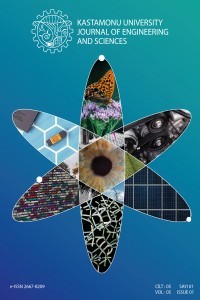Genome-Wide Determination, Characterization and Bioinformatic Analysis of Cold Shock Protein (CSP) Genes In Atlantic Salmon (Salmo salar), Carp (Cyprinus carpio) and Rainbow Trout (Oncorhynchus mykiss)
Somon Balığı, Sazan Balığı, Gökkuşağı Alabalığı, Biyoinformatik, Soğuk Şoku Proteini
Genome-Wide Determination, Characterization and Bioinformatic Analysis of Cold Shock Protein (CSP) Genes In Atlantic Salmon (Salmo salar), Carp (Cyprinus carpio) and Rainbow Trout (Oncorhynchus mykiss)
Atlantic Salmon, Carp, Rainbow Trout, Cold Shock Protein,
___
- [1] Lien, S., Koop, B. F., Sandve, S. R., Miller, J. R., Kent, M. P., Nome, T., and Grammes, F.. The Atlantic salmon genome provides insights into rediploidization. Nature, 533(7602), 200, 2016.
- [2 ] Verspoor, E., Stradmeyer, L., & Nielsen, J. L. (Eds.). The Atlantic salmon: genetics, conservation and management. John Wiley & Sons, 2008.
- [3] Kottelat, M. and J. Freyhof,. Handbook of European freshwater fishes. Berlin, 2007, 646 pp.
- [4] Courtenay, Walter R.; Welcomme, R. L., "International Introductions of Inland Aquatic Species". Copeia. 1989 (2): 520.
- [5] Balon, Eugene K., "Probable Origin of Domestication", Domestication of the carp Cyprinus caprio L., Royal Ontario Museum, 1974, pp. 16–18.
- [6] Banarescu, P., B. Coad., Cyprinids of Euroasia. in I Winfield, J Nelson, eds. Cyprinids Fishes, London: Chapman and Hall, 1991, Pp 127-155.
- [7] McCrimmon, H., Carp in Canada. Fisheries Research Board Of Canada, 1968.
- [8] Fornshell, G.. Rainbow trout—challenges and solutions. Reviews in Fisheries Science, 2002, 10(3-4), 545-557.
- [9] Hardy, R. W., Rainbow trout, Oncorhynchus mykiss. Nutrient requirements and feeding of finfish for aquaculture, 2002,184-202.
- [10] Thieringer, H. A., Jones, P. G., & Inouye, M., Cold shock and adaptation. Bioessays, 1998, 20(1), 49-57.
- [11] Phadtare, S., Alsina, J., & Inouye, M., Cold-shock response and cold-shock proteins. Current opinion in microbiology, 1999, 2(2), 175-180.
- [12] Lindquist, J. A., & Mertens, P. R., Cold shock proteins: from cellular mechanisms to pathophysiology and disease. Cell Communication and Signaling, 2018, 16(1), 63.
- [13] Keto-Timonen, R., Hietala, N., Palonen, E., Hakakorpi, A., Lindström, M., & Korkeala, H., Cold shock proteins: a minireview with special emphasis on Csp-family of enteropathogenic Yersinia. Frontiers in microbiology, 2016, 7, 1151.
- [14] Crawshaw, L. I., Physiological and behavioral reactions of fishes to temperature change. Journal of the Fisheries Board of Canada, 1977, 34(5), 730-734.
- [15] Tanck, M. W. T., Booms, G. H. R., Eding, E. H., Bonga, S. W., & Komen, J., Cold shocks: a stressor for common carp. Journal of fish Biology, 2000, 57(4), 881-894.
- [16] Fry, F. E. J., Effects of the environment on animal activity. Publ. Out. Fish. Res. Lab., 1947, 55(68), 1-62.1
- [17] Donaldson, M. R., Cooke, S. J., Patterson, D. A., & Macdonald, J. S., Cold shock and fish. Journal of Fish Biology, 2008, 73(7), 1491-1530.
- [18] Kumar, S., Stecher, G., & Tamura, K., MEGA7: molecular evolutionary genetics analysis version 7.0 for bigger datasets. Molecular biology and evolution, 2016, 33(7), 1870-1874.
- [19] Hu B., Jin J., Guo A.Y., Zhang H., Luo J. and Gao G., GSDS 2.0: an upgraded gene feature visualization server. Bioinformatics, 2015, 31(8), 1296-1297.
- [20] Saitou, N., & Nei, M., The neighbor-joining method: a new method for reconstructing phylogenetic trees. Molecular biology and evolution, 1987, 4(4), 406-425.
- [21] Bailey, T. L., & Elkan, C., Fitting a mixture model by expectation maximization to discover motifs in bipolymers, 1994.
- [22] Quevillon, E., Silventoinen, V., Pillai, S., Harte, N., Mulder, N., Apweiler, R., & Lopez, R.,. InterProScan: protein domains identifier. Nucleic acids research, 2005, 33(suppl_2), W116-W120.
- [23] Conesa, A., & Götz, S., Blast2GO: A comprehensive suite for functional analysis in plant genomics. International journal of plant genomics, 2008.
- [24] Kelley, L. A., & Sternberg, M. J., Protein structure prediction on the Web: a case study using the Phyre server. Nature protocols, 2009, 4(3), 363.
- [25] Jones-Rhoades, M. W., & Bartel, D. P., Computational identification of plant microRNAs and their targets, including a stress-induced miRNA. Molecular cell, 2004, 14(6), 787-799.
- Yayın Aralığı: Yılda 2 Sayı
- Başlangıç: 2015
- Yayıncı: Kastamonu Üniversitesi
Büşra ÖZKAN, Buket USTAOĞLU, Tevfik Hasan CAN, Mehmet Cengiz BALOGLU, Yasemin CELİK ALTUNOGLU
Mehmet ÇETİN, Oğuzhan ÇOBANOĞLU
Advanced Road Materials Highway Infrastructure and Features
Mehmet ÇETİN, Abdelwahab Z. Amaitik ALTERA, Oğuzhan Yavuz BAYRAKTAR
Synthesis of New Thiacalix[4]arene Based Azo Dyes and Analysis of Absorption Spectrums
